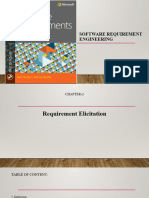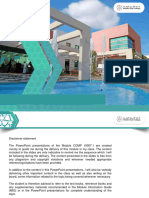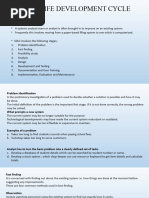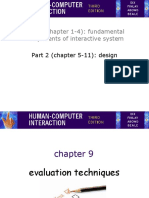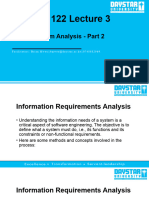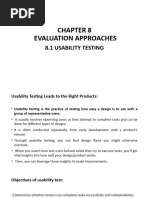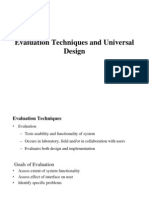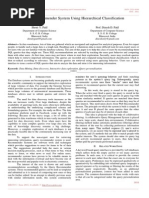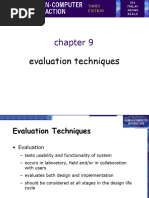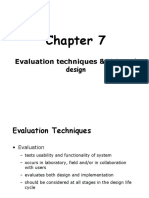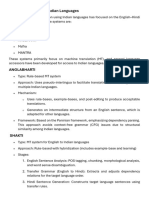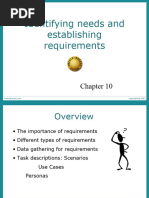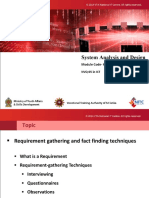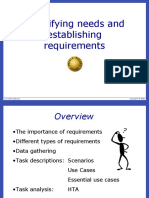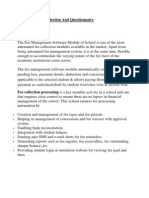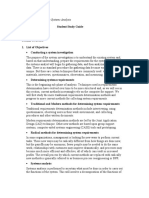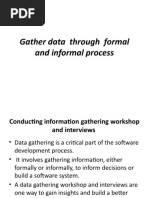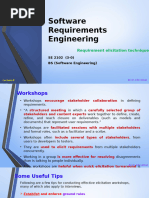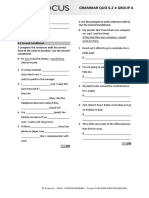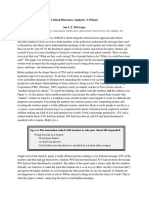Relevance Feedback & Query Expansion
Relevance Feedback & Query Expansion
Uploaded by
Mi YaCopyright:
Available Formats
Relevance Feedback & Query Expansion
Relevance Feedback & Query Expansion
Uploaded by
Mi YaOriginal Description:
Copyright
Available Formats
Share this document
Did you find this document useful?
Is this content inappropriate?
Copyright:
Available Formats
Relevance Feedback & Query Expansion
Relevance Feedback & Query Expansion
Uploaded by
Mi YaCopyright:
Available Formats
12/8/2013
Relevance Feedback & Query Expansion
What is Relevance Feedback? What is Query Expansion? The difference between relevance feedback & query expansion Advantages & disadvantages Methods
Global Methods
Usually, users will facing a failure of a straightforward retrieval system. For example: you want to search for aircraft to match plane. The methods for tackling this problem in IR split into TWO major classes:
Global methods Local methods
Global methods techniques for expanding or reformulating query terms independent of the query and results returned from it, so that changes in the query wording will cause the new query to match other semantically similar terms. Methods/approaches:
Query expansion/reformulation with a thesaurus generation Query expansion via automatic thesaurus generation Techniques like spelling correction
Vocabulary tools for query reformulation
Various user supports in search process can help the user see how their searches are or are not working. Includes information about words that were omitted from the query because they were on stop lists, what words were stemmed to, the number of hits on each term or phrase, and whether words were dynamically turned into phrases.
Query expansion
Users give additional input on query words or phrases, suggesting terms or saying whether they regard system suggestions as good or bad search terms. <add>
12/8/2013
The central question in the use of query expansion is how to generate alternative or expanded queries for the user. The most common form of query expansion is using some form of thesaurus. For each term, t, in a query, the query can be automatically expanded with synonyms and related words of t from the thesaurus.
Methods for building a thesaurus for query expansion:
Use of a controlled vocabulary that is maintained by human editors. A manual thesaurus An automatically derived thesaurus Query reformulations based on query log mining
Automatic Thesaurus Generation
As an alternative to the cost of a manual thesaurus, generate a thesaurus automatically by analyzing a collection of documents. Two approaches:
Exploit word co-occurrence Use a shallow grammatical analysis of the text and to exploit grammatical relations or grammatical dependencies. WORD absolutely senses keeping makeup NEAREST NEIGHBOURS Absurd, whatsoever, totally, exactly,.. Grasp, truly, clumsy, nave, Hoping, bring, wiping, some, would, Repellent, lotion, glossy, sunscreen, skin, gel,..
12/8/2013
Local Methods
Local methods techniques that adjust a query relative to the documents that initially appear to match the query. Methods/approaches:
Relevance feedback Pseudo-relevance feedback Indirect relevance feedback
Relevance feedback
The idea of relevance feedback is to involve the user in the retrieval process so as to improve the final set. In particular, the user gives feedback on the relevance of documents in an initial of results. Procedures:
The user issues a short/simple query The system returns an initial set of retrieval results The user marks some returned documents as relevant or not relevant The system computes a better representation of the information need based on the user feedback. The system displays a revised set of retrieval results.
When does relevance feedback work?
The success of relevance feedback depends on certain assumptions.
- When the user has to have sufficient knowledge to be able to make an initial query which is at least somewhere close to the documents the desire.
Pseudo-relevance feedback
Known as blind relevance feedback Method that provides automatic local analysis, automates the manual part of relevance feedback so that the user gets improved retrieval performance without an extended interaction. How? The method is to do normal retrieval to find am initial set of most relevant documents,
Then ASSUME that the top k ranked documents are relevant, And finally to do relevance feedback as before under this assumption
Cases where relevance feedback is not sufficient:
Misspelling Cross language IR Mismatch of searchers vocabulary VS. collections vocabulary
Indirect Relevance Feedback
Implicit relevance feedback Implicit feedback is less reliable than explicit feedback but is more useful than pseudo relevance feedback, which contain no evidence of user judgment. While users are often reluctant to provide explicit feedback, it is easy to collect implicit feedback in large quantities for a high volume system, such as a web search engine.
Summary
Query expansion is often effective in increasing recall. High cost to manually producing a thesaurus and then updating it for scientific changes. In general domain-specific thesaurus, general thesauri and dictionaries give far too little coverage of the rich domain-particular vocabularies of most scientific fields.
12/8/2013
Summary..
May also significantly decrease precision, particularly when the query contains ambiguously terms. Overall, query expansion is less successful than relevance feedback, though it may be as good as pseudo-relevance feedback. Relevance feedback is successful use requires queries for which the set of relevant documents is medium to large. Full relevance feedback is often painful for the user, and its implementation is not very efficient in most IR systems.
Depends on the understandable to the system user.
You might also like
- Root Cause Analysis Handbook: A Guide to Efficient and Effective Incident InvestigationFrom EverandRoot Cause Analysis Handbook: A Guide to Efficient and Effective Incident InvestigationNo ratings yet
- Data GatheringDocument29 pagesData GatheringJenny Sison-Wilson67% (18)
- Help at Hand - Ideas For The Developing TeacherDocument38 pagesHelp at Hand - Ideas For The Developing TeacherLuka RisticNo ratings yet
- Chap - Week8 - Queries and Information NeedsDocument44 pagesChap - Week8 - Queries and Information NeedsVISALINI VIJAYANNo ratings yet
- Ch2 Requirement ElicitationDocument27 pagesCh2 Requirement ElicitationShams SiddiquiNo ratings yet
- Fact Finding TechniquesDocument56 pagesFact Finding TechniqueswalllacNo ratings yet
- 4. Deep Parsing and Tools for NLPDocument50 pages4. Deep Parsing and Tools for NLPPunya SriNo ratings yet
- Unit-VDocument54 pagesUnit-VctscognizanthrNo ratings yet
- Chapter 12Document20 pagesChapter 12CLAsH with DxNo ratings yet
- Important Questions For SoftwareDocument29 pagesImportant Questions For Softwarep229321No ratings yet
- AACS1304 03 - System Analysis 202005Document125 pagesAACS1304 03 - System Analysis 202005WIN YE KUANNo ratings yet
- PDF Document (3) 2Document34 pagesPDF Document (3) 2WEI SZI LIMNo ratings yet
- Assignment of System Analysis and Design Bally Kelly YvanDocument4 pagesAssignment of System Analysis and Design Bally Kelly Yvankelly kim ndayishimiyeNo ratings yet
- 01-02 Writing Good Software Engineering Research PapersDocument34 pages01-02 Writing Good Software Engineering Research Paperslilialnas@gmail.comNo ratings yet
- Unit I - IrsDocument85 pagesUnit I - Irskeerthanazion546No ratings yet
- SAD - Unit 2 - Ver1Document27 pagesSAD - Unit 2 - Ver1قدس العجميNo ratings yet
- Systems Development Life CycleDocument21 pagesSystems Development Life Cyclejamb2316No ratings yet
- Information Retrieval: Adt-V UnitDocument106 pagesInformation Retrieval: Adt-V UnitMMCAS SWYAMNo ratings yet
- Data Collection MethodsDocument44 pagesData Collection Methodsmahnoor fatima100% (1)
- Part 1 (Chapter 1-4) : Fundamental Components of Interactive SystemDocument46 pagesPart 1 (Chapter 1-4) : Fundamental Components of Interactive SystemM. Talha NadeemNo ratings yet
- Systems Analysis: Systems Planning and Initial InvestigationDocument7 pagesSystems Analysis: Systems Planning and Initial Investigationsetup vpnNo ratings yet
- Lecture 5Document51 pagesLecture 5willsbruce2No ratings yet
- Module 8 - HCIDocument19 pagesModule 8 - HCImanjuNo ratings yet
- Re 2Document60 pagesRe 2sandeightzerosNo ratings yet
- User Interfaces and Visualization: Prof - Pravin V.ShindeDocument24 pagesUser Interfaces and Visualization: Prof - Pravin V.ShindePravin ShindeNo ratings yet
- Core Business SkillsDocument56 pagesCore Business SkillsMakena OburaNo ratings yet
- Evaluation Techniques and Universal DesignDocument36 pagesEvaluation Techniques and Universal DesignMarta TeferiNo ratings yet
- Unit 7: Evaluation TechniquesDocument41 pagesUnit 7: Evaluation TechniquesKiruthiga DeepikaNo ratings yet
- 4 th unitDocument13 pages4 th unit9shad.testNo ratings yet
- Fact Finding TechniquesDocument28 pagesFact Finding TechniquesCathy Love MoneroNo ratings yet
- Query Recommender System Using Hierarchical ClassificationDocument4 pagesQuery Recommender System Using Hierarchical ClassificationEditor IJRITCCNo ratings yet
- E3 Chap 09 - 1Document30 pagesE3 Chap 09 - 1sokifa7599No ratings yet
- 02 16 Chitty Chat Bot and Conversational AIDocument10 pages02 16 Chitty Chat Bot and Conversational AINayeem UzzamanNo ratings yet
- Chapter 4Document30 pagesChapter 4OngHongTeckNo ratings yet
- Chapter 7Document59 pagesChapter 7Efoy TechNo ratings yet
- Information Retreival MethodsDocument19 pagesInformation Retreival Methodssans323597No ratings yet
- Chapter 10 ID2e SlidesDocument56 pagesChapter 10 ID2e Slideshajra qadir KhanNo ratings yet
- CHAPTER 15 System Life CycleDocument3 pagesCHAPTER 15 System Life CycleMatthew GunawanNo ratings yet
- L#7-8 - Reqs ElicitationDocument30 pagesL#7-8 - Reqs Elicitation221090No ratings yet
- Unit 1 IrtDocument21 pagesUnit 1 IrtpriyadharshinianbuvaananNo ratings yet
- 3.requirement Gathering and Fact Finding TechniqesDocument21 pages3.requirement Gathering and Fact Finding TechniqesGeethma RamanayakaNo ratings yet
- SFT L 2 RVWRDocument5 pagesSFT L 2 RVWRRegi Garcia DoriaNo ratings yet
- v1_covered (1)Document26 pagesv1_covered (1)fetnbadaniNo ratings yet
- Lec 7Document32 pagesLec 7ranaumair1326No ratings yet
- The Process of Interaction DesignDocument106 pagesThe Process of Interaction DesignEmran AljarrahNo ratings yet
- System RequirementsDocument15 pagesSystem RequirementsRoxas TanNo ratings yet
- Identifying Needs and Establishing RequirementsDocument35 pagesIdentifying Needs and Establishing RequirementsEdy HrNo ratings yet
- Data Collection and QuestionnaireDocument9 pagesData Collection and QuestionnaireYash KapoorNo ratings yet
- Introduction To Business Systems AnalysisDocument11 pagesIntroduction To Business Systems AnalysisMahdi GhulamiNo ratings yet
- Unit-3 IrsDocument46 pagesUnit-3 Irsganeshkota962No ratings yet
- Lecture 4 - Establishing RequirementsDocument34 pagesLecture 4 - Establishing RequirementstamjidNo ratings yet
- Lo 4Document15 pagesLo 4nahom tesfuNo ratings yet
- Search Behaviour PatternsDocument23 pagesSearch Behaviour PatternsRamzi AlqrainyNo ratings yet
- 8th Sem Project PptDocument25 pages8th Sem Project PptJohn DoeNo ratings yet
- Basic Software Engineering: Prof. Vijya Tulsani, Assistant ProfessorDocument28 pagesBasic Software Engineering: Prof. Vijya Tulsani, Assistant ProfessorKuldeep ParekhNo ratings yet
- You Need To KnowDocument7 pagesYou Need To KnowDesi ArisandiNo ratings yet
- Sad Chapter 3Document14 pagesSad Chapter 3mickyaszenebeNo ratings yet
- Methods of ResearchDocument10 pagesMethods of ResearchHenry ListerNo ratings yet
- Notes Part2Document3 pagesNotes Part2mounaNo ratings yet
- Database SystemsDocument24 pagesDatabase SystemsNasir AliNo ratings yet
- Lecture-8Document12 pagesLecture-8s2023065056No ratings yet
- Rumus Dan Contoh Kalimat Simple Past TenseDocument2 pagesRumus Dan Contoh Kalimat Simple Past Tenseberliana parapakNo ratings yet
- AwryggvvhDocument8 pagesAwryggvvhk24xnzp2qyNo ratings yet
- Where Are You From1 PDFDocument13 pagesWhere Are You From1 PDFira EridaniNo ratings yet
- Francophone CountriesDocument3 pagesFrancophone CountriesAnonymous 39g2jG6100% (1)
- Midterm Module Nihongo Jikoshoukai 1Document14 pagesMidterm Module Nihongo Jikoshoukai 1chelseaabuan30No ratings yet
- Lu03 Public SpeakingDocument13 pagesLu03 Public SpeakingCharry Dv DGNo ratings yet
- Focus2 2E Grammar Quiz Unit6 2 GroupADocument1 pageFocus2 2E Grammar Quiz Unit6 2 GroupALuliNo ratings yet
- Critical Discourse Analysis, A PrimerDocument9 pagesCritical Discourse Analysis, A PrimerZackNo ratings yet
- The Art of C++ - MiniprojectsDocument354 pagesThe Art of C++ - MiniprojectsMegha AgrawalNo ratings yet
- James Joyce simplifiedDocument4 pagesJames Joyce simplifiedAngeNo ratings yet
- Programmation Orientée Objet Par C++Document14 pagesProgrammation Orientée Objet Par C++Carlo CocoNo ratings yet
- Unit2 5.2.1 and 5.2.2Document44 pagesUnit2 5.2.1 and 5.2.2Mrs. LaraNo ratings yet
- DSA - M03 - C01 - SLM - StacksDocument40 pagesDSA - M03 - C01 - SLM - StacksZaisha RomaniaNo ratings yet
- English Verbs Prepositions DictionaryDocument19 pagesEnglish Verbs Prepositions DictionaryAlexandru Ionut ApostuNo ratings yet
- (Qichwa - Quechua Family - Junà N) Willem Adelaar - Tarma Quechua - Grammar, Texts, Dictionary (1977, Peter de Ridder Press) - Libgen - LiDocument508 pages(Qichwa - Quechua Family - Junà N) Willem Adelaar - Tarma Quechua - Grammar, Texts, Dictionary (1977, Peter de Ridder Press) - Libgen - Lilpx200707No ratings yet
- The Infinitive in The English and Ukrainian LanguagesDocument8 pagesThe Infinitive in The English and Ukrainian Languagesлеся бородайNo ratings yet
- Basic Maths OperationsDocument2 pagesBasic Maths OperationsSebastian Fuentes escobarNo ratings yet
- Judging BP Debates - GuidenceDocument16 pagesJudging BP Debates - Guidencevtsip88No ratings yet
- PP Summary of Journal ArticleDocument15 pagesPP Summary of Journal Articleamni faiqahNo ratings yet
- Sophia CVDocument3 pagesSophia CVNst TnagarNo ratings yet
- Colegio de Immaculada Concepcion of Bulacan, Inc. Mataas Sampalok, Bulihan, Plaridel, Bulacan (044) 764 - 37 - 70 / (0933) 819-88 - 37 Master SheetDocument19 pagesColegio de Immaculada Concepcion of Bulacan, Inc. Mataas Sampalok, Bulihan, Plaridel, Bulacan (044) 764 - 37 - 70 / (0933) 819-88 - 37 Master Sheetshiela manalaysayNo ratings yet
- Planificacion Primer Año 22 de Mayo de 2022 Modulo 1 InglesDocument3 pagesPlanificacion Primer Año 22 de Mayo de 2022 Modulo 1 InglesmatiasNo ratings yet
- Question Bank For B.A P Aecc GE B.com HDocument7 pagesQuestion Bank For B.A P Aecc GE B.com HDolly ChauhanNo ratings yet
- Level 2 Test 1ADocument5 pagesLevel 2 Test 1Akojot197406No ratings yet
- Sesión de Aprendizaje N°: Modal Meaning ExampleDocument4 pagesSesión de Aprendizaje N°: Modal Meaning ExampleJuan Carlos Aguilar SandovalNo ratings yet
- 21st Century Literature From The Philippines and The WorldDocument5 pages21st Century Literature From The Philippines and The WorldAlyanna Jozeah100% (1)
- Fmu Lesson Plan 2015Document4 pagesFmu Lesson Plan 2015api-301407714No ratings yet
- Reading Comprehension Family Describing PeopleDocument5 pagesReading Comprehension Family Describing PeoplefernandoNo ratings yet
- Meeting 6 Narrative TextDocument7 pagesMeeting 6 Narrative TextNur MuthmainnahNo ratings yet




